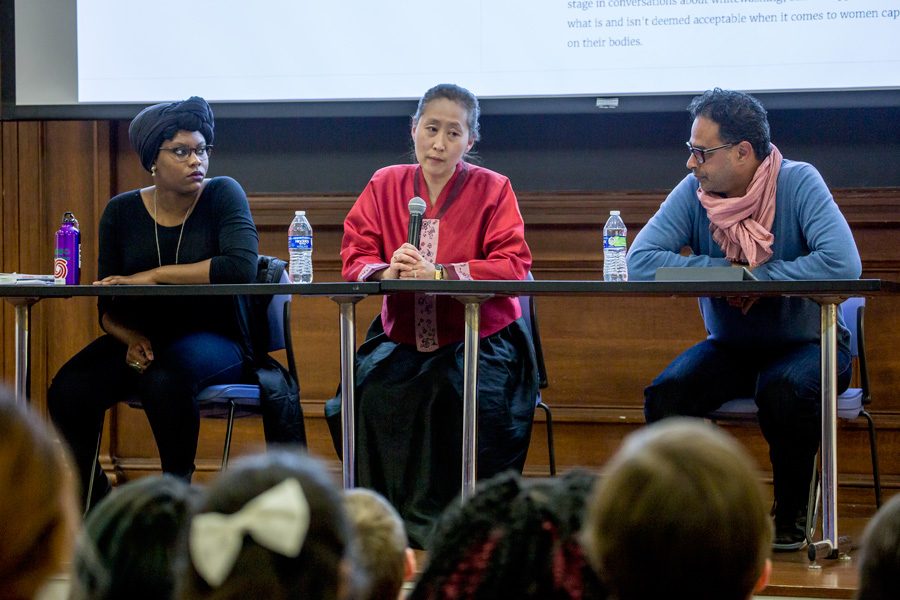Northwestern Sex Week hosts panel about racial fetishism
Zack Laurence/Daily Senior Staffer
Asian American Studies Prof. Ji-Yeon Yuh, Anthropology Ph. D. student Ashley Agbasoga and African American Studies Prof. Alexander Weheliye speak at Northwestern Sex Week’s panel discussion about racial fetishism Thursday night. The event had about 60 students in attendance.
April 15, 2016
To Asian American Studies Prof. Ji-Yeon Yuh, stereotyping is a form of dehumanization.
Yuh spoke about sexual stereotypes and racial fetishization of non-white woman Thursday night as part of a Northwestern Sex Week panel. Anthropology graduate student Ashley Agbasoga and African American Studies Prof. Alexander Weheliye led the discussion along with Yuh in front of about 60 students.
The term “fetish” was first used in West Africa by the Portuguese to describe gold and religious objects at the beginning of the slave trade and African colonization, Weheliye said. For this reason, he said “racial” fetishization is a misnomer because the concept has always been racialized.
Weheliye also talked about America’s role in racial fetishization historically — from systemic rape of slaves during the late 18th and early 19th century to today’s pop culture controversies such as Nicki Minaj’s “Anaconda” music video and Kim Kardashian’s Paper Magazine cover.
“Sexual fetishization is not a byproduct of racial difference, but racial difference is established through sexual fetishization,” Weheliye said.
Yuh highlighted the contradicting stereotypes surrounding Asian American women who are depicted as “exotically degraded human (beings)” as well as “submissive, docile, ‘Leave It to Beaver’ kind of (women).”
Yuh said the existence of these stereotypes not only privileges men but endangers an individual’s humanity.
One audience member asked about the difference between having a “type” and a fetish.
Yuh said a fetish implies a lack of respect for the real person behind the racial, gender or sexual identity. Contrastly, a “type” could be simply when someone finds black hair and brown eyes “more beautiful than any other” type.
The event also featured questions posted on the Facebook event page, including what to do if one’s sexual preference falls into a stereotype and how non-binary genders and other sexualities fit into these identities.
“So often in the media, we see a lot of racial stereotypes, and it’s really dangerous when they start coming into play with something like sex,” Medill freshman Isabella Soto, a member of NU Sex Week, told the Daily.
Soto, a former Daily staffer, said Sex Week is important because the program does not assume that people come in with the same level of understanding about sexual health.
“It’s not necessarily pushing sex education in your face,” Soto said. “It’s saying, ‘Hey, if you’d like to learn about this or delve deeper into different aspects regarding sexual health and sexuality, we have events for you.’”
Email: fathma@u.northwestern.edu
Twitter: @fathma_rahman


